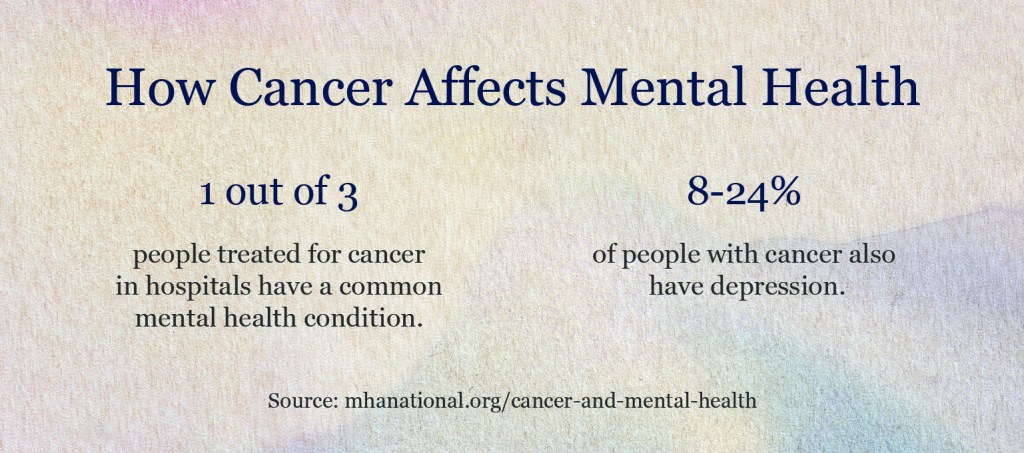Managing Mental Health After a Cancer Diagnosis

Experiencing a life-threatening illness affects more than a patient’s physical health. The emotional stress, uncertainty, and physical pain can all take a toll on an individual’s mental health. This is especially true for cancer patients. From processing the news of a cancer diagnosis to navigating the plan of care, it is important for cancer patients to focus on both the body and the mind.
While this can be challenging, the support of loved ones can help individuals undergoing cancer treatment take stock of how they are feeling physically and emotionally to manage their mental health.
How Cancer Affects Mental Health
Receiving a cancer diagnosis can be a life-changing and emotional event for patients and their families, making it important to monitor one’s mental health alongside physical health. According to a resource from Mental Health America on cancer and mental health, it is estimated that up to one-third of people treated for cancer in hospitals have a common mental health condition. Additionally, it is believed that anywhere from 8% to 24% of people with cancer also have depression.

Research has also shown there may be a connection between mental health and cancer survival; in one study of U.S. veterans, cancer patients who also received mental health services lived longer than those who did not. While the reason for the connection is not known, researchers speculate that cancer patients who are experiencing depression may be less likely to follow treatment plans and take preventive screenings and more likely to miss therapy appointments.
Mental Health Symptoms: Distress, Depression, and Anxiety
When going through cancer treatment, patients, along with their family and health care provider, can monitor for signs of mental health issues. Many of the feelings one may experience are similar to those of an individual with a mental health condition.
However, “some mental health symptoms may overlap with symptoms related to cancer or side effects from treatment, including appetite, weight, and sleep changes, as well as changes in concentration and motivation,” according to an article in Oncology Nurse Advisor. This factor makes it even more important for cancer patients to have open, honest communication with their support system.
Mental health issues commonly experienced by cancer patients include distress, depression, and anxiety.
Distress
The experience of emotional pain due to stressful life changes that causes feelings of sadness or worry. Feelings of distress can manifest in ways similar to depression and anxiety disorders.
Symptoms may include:
- Feelings of sadness, fear, or anger
- Sense of helplessness, hopelessness, or being out of control
- Experiencing uncertainty about your purpose or meaning in life
- Pulling away from friends and family
- Worrying about your role at home or socially
Depression
A medical condition that can cause an individual to experience feelings of sadness, loss of interest in activities they once enjoyed, and, in some cases, thoughts of suicide.
Symptoms of depression may include:
- Emotional numbness
- Feeling nervous or shaky
- Having a sense of guilt
- Experiencing moodiness
- Having a hard time concentrating or feeling scatterbrained
- Finding it hard to participate in things you used to enjoy
- Thoughts about hurting yourself or committing suicide
- Sleep problems such as insomnia, oversleeping, or having nightmares
- Racing heart, dry mouth, or increased perspiration
- Upset stomach, headaches, or other pains
- Changes in energy level
Anxiety
A disorder that causes feelings of worry, tension, and intrusive thoughts. Anxiety can worsen when dealing with stressful life events.
Symptoms may include:
- Uncontrolled worry
- Trouble focusing thoughts
- Muscle tension
- Trembling or shaking
- Restlessness
- Dry mouth
- Irritability or angry outbursts
Sources:
How to Address Mental Health in Cancer Patients
When a cancer patient is experiencing symptoms of depression or other mental health issues, there are many steps they can take to seek help.
Tips for Managing Mental Health
Start with a self screening. Taking an online mental health screening, such as Mental Health America’s mental health tests, can be a first step in reflecting on one’s feelings before talking to their health care provider or a mental health specialist.
Talk to a professional. It is important for cancer patients to utilize their health care provider for information on physical and emotional health. They may be able to help with certain mental health issues and can provide a reference to a counselor or other support services.
Ask for help. Family members and friends can serve as a great support system. Cancer patients are encouraged to ask for help when they need it.
Join a support group. Talking to others who have had similar experiences can be therapeutic. Cancer patients and survivors may be able to find in-person and virtual support groups through hospitals as well as local chapters of cancer support organizations. The National Cancer Institute also offers an online directory of support services for cancer patients.
Live in the present. Finding ways to feel grounded and focused on the present moment can help to avoid feelings of worry about future events and outcomes. Prayer and spiritual practices are helpful to some cancer patients. Other options include meditation and mindfulness exercises.
Keep a journal. It can be hard to remember feelings from a week ago, let alone the entire span of cancer treatment. Tracking one’s emotions on a daily basis can serve as a reminder for an individual to reflect on how they are feeling and aid in monitoring symptoms of mental health issues.
Make time for exercise. While the ability to participate in different levels of physical activity may vary depending on one’s treatment regimen and diagnosis, exercise can play a helpful role in managing mental health. Even light walking can help with feelings of anxiety and depression.
Sources:
How Loved Ones Can Support Cancer Patients
Cancer patients can benefit from the support of friends and family at every step of their journey. The following advice can help individuals support their loved one with a cancer diagnosis.
Cancer and Mental Health: Advice for Loved Ones
Talk on their terms. Be sensitive to your loved one’s feelings, and encourage but do not force them to talk with you and other family members and friends about their cancer diagnosis.
Listen. It is important to be there for someone who is going through cancer treatment. One of the best things to do is to listen well and fight the urge to deny or discount any negative feelings they share.
Ask a health care provider. Spouses and family members who interact with their loved one’s health care team can be proactive in asking for information about cancer and mental health. If needed, they can also support their loved one by asking for a referral to support services.
Join in on physical activity. Taking a walk together or engaging in other physical activities with a loved one can encourage them to keep up with exercise, benefiting their mental and physical health as they go through the cancer treatment process.
Respect Boundaries. Unless they ask for input, it is often best to not push a cancer patient on medical advice or treatment options they are not interested in. Honor their autonomy, and provide them with the support they ask for.
Practice self care. Sometimes caretakers forget to take care of themselves. It’s important for loved ones of cancer patients to take time for themselves, stay engaged in activities, and be in tune with and honest about their emotions. Avoiding emotional burnout makes it easier to take care of the people you love.
Sources:
Please note that this article is for informational purposes only. Individuals should consult their health care provider before following any of the information provided.
Citation for this content: Nursing@Georgetown, the online MSN program from the School of Nursing & Health Studies


